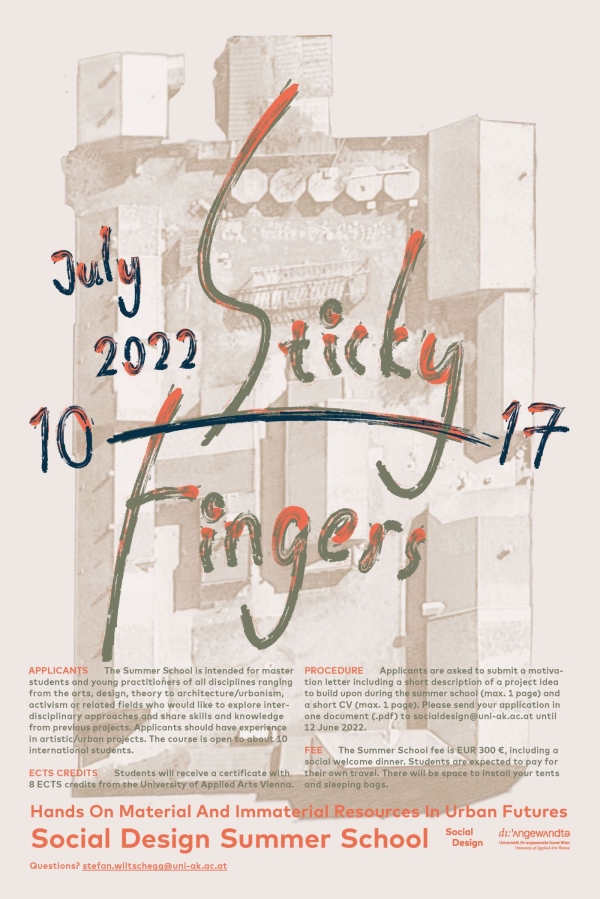This year’s Social
Design Summer School is – for the second time – taking place in Rothneusiedl, a neighbourhood of approximately 700 inhabitants
and also part of Vienna’s 10th district. Though the area is located at the southern outskirts of Vienna it has been populated
since thousands of years, being a site for early agricultural and livestock farming. It was used for viniculture by former
soldiers of Roman legions, the “Migration of the Peoples” left their traces, as did the Magyars, Ottomans, periods of war
and peace, plagues and natural catastrophes. With the foundation of brickworks at the end of the 18th century the population
grew at a fast pace. Around 1795, about 104 people lived there, hundred years later the local population had grown to 2000.
The bricks produced in the area served to build all representative monuments in Vienna’s city center while the workers’ living
conditions remained extremely poor and life threatening. Mid last century, the brick production was abandoned and the area
was recovered in greenery and started to be partly urbanized. Big parts of Rothneusiedl also look back on a long history of
agricultural land but are now zoned for urbanization, with greenery transitioning into “green infrastructure”. In 25 years,
the remaining fields of Rothneusiedl will be the ground for a new densely built part of Vienna, providing housing for a fast
growing city.
The Summer School will be based at the Haschahof aka Zukunftshof, a historical grange with original
buildings from the 19th century. The complex will also serve as a future urban center for the upcoming development: a first
local urban center that will be followed by the building of housing will follow (approximately around 2045). So far, the grange
is still surrounded by fields and meadows, but their destiny is determined. Agricultural land is zoned for building new neighbourhoods
of Vienna for housing the many.
The topic of the Summer School is focusing on the resources of the place, natural,
historical and cultural resources, graspable but not necessarily material.
The great program of 10 days will deal
with the following questions:
What are the immaterial resources of the place? What will they be? (exploration,
identification, protection, development)How to get a hold of immaterial resources?How to get hands on material resources?Is
there a genius loci? And if so: how to deal with it?How to create urban qualities and to avoid the risks of a suburban “Alltagsleere”
(void of the everyday)?How to involve (future) inhabitants, dwellers, settlers, neighbors – especially those who are young
today and might live there “tomorrow”?How to create a future for upcoming generations?How to avoid “fast housing”?How to vitalise
activism in terms of interests and wish production?How could agricultural green be partly transformed into green infrastructure
of a city quarter?How to develop a local center with lively public spaces for all?How to plan “dysfunctional spaces” (Lucius
Burckhardt) especially for youth to explore, to hide and seek?Which artistic strategies could be applied? How?
On
the last day we will celebrate a great public feast from plates made out of the local clay.
For the Summer School,
a camping site will be installed at Zukunftshof, depending on the weather conditions there will also possibilities to sleep
indoors. Participants can reach the center of Vienna with public transport.
Guests from the University of Applied
Arts and TU Wien, project partners of TRUSTMAKING from The Netherlands, Norway and Lithuania, and artists, architects, activists,
urbanists, local snail farmers will join.
The program includes urban mining, digging clay, using clay, discovery
walks along fields and creeks, explorations and encounters with human and non-human neighbors, excursions to close and far-away
old and new city quarters, utopian renderings for future uses and many more actions and exchanges.
APPLICANTSThe Summer School is intended for master students and young practitioners of all disciplines ranging from the arts, design,
theory to architecture/urbanism, activism or related fields who would like to explore interdisciplinary approaches and share
skills and knowledge from previous projects. Applicants should have experience in artistic/urban projects. The course is open
to about 10 international students.
PROCEDUREApplicants are asked to submit a motivation
letter including a short description of a project idea to build upon during the summer school (max. 1 page) and a short CV
(max. 1 page). Please send your application in one document (.pdf) to
socialdesign@uni-ak.ac.at
until 12 June 2022.
ECTS CREDITSStudents will receive a certificate with 8 ECTS credits
from the University of Applied Arts Vienna.
FEEThe Summer School fee is EUR 300 €, including
a social welcome dinner. Students are expected to pay for their own travel. There will be space to install your tents and
sleeping bags.
Q+ADo not hesitate to get back to us for any further questions. Stefan will
answer your questions:
stefan.wiltschegg@uni-ak.ac.atPROGRAM:Please, register with Stefan to get the regular updates about the program.
Further details about the contributers:
https://keramikstudio.uni-ak.ac.athttps://jpi-urbaneurope.eu/project/trustmaking/http://socialdesign.ac.athttps://www.treecycle.atTime10 – 17 July 2022
www.zukunftshof.at



